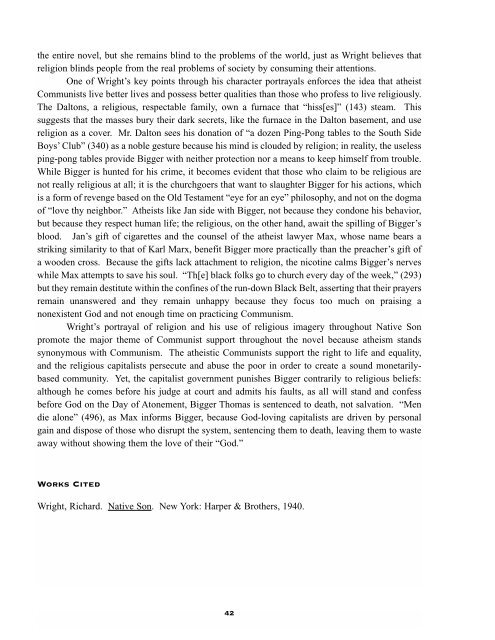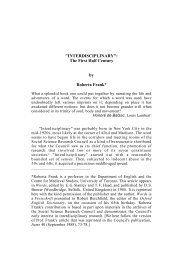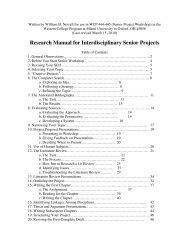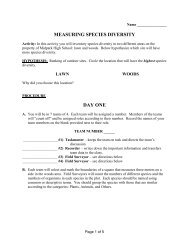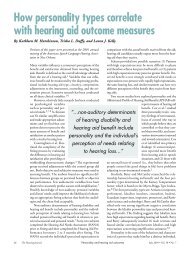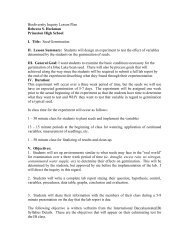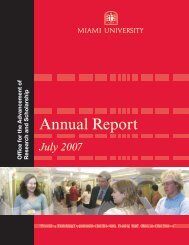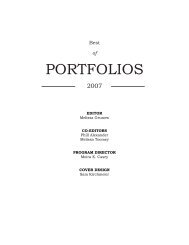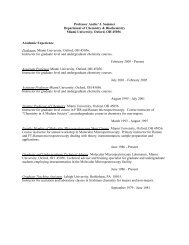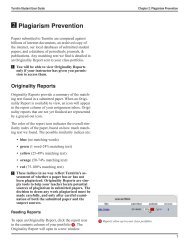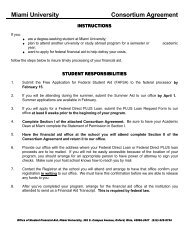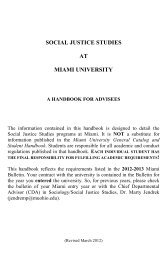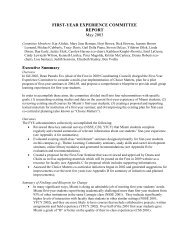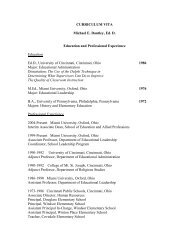Best of Miami Portfolios 2001 - Units.muohio.edu
Best of Miami Portfolios 2001 - Units.muohio.edu
Best of Miami Portfolios 2001 - Units.muohio.edu
You also want an ePaper? Increase the reach of your titles
YUMPU automatically turns print PDFs into web optimized ePapers that Google loves.
the entire novel, but she remains blind to the problems <strong>of</strong> the world, just as Wright believes that<br />
religion blinds people from the real problems <strong>of</strong> society by consuming their attentions.<br />
One <strong>of</strong> Wright’s key points through his character portrayals enforces the idea that atheist<br />
Communists live better lives and possess better qualities than those who pr<strong>of</strong>ess to live religiously.<br />
The Daltons, a religious, respectable family, own a furnace that “hiss[es]” (143) steam. This<br />
suggests that the masses bury their dark secrets, like the furnace in the Dalton basement, and use<br />
religion as a cover. Mr. Dalton sees his donation <strong>of</strong> “a dozen Ping-Pong tables to the South Side<br />
Boys’ Club” (340) as a noble gesture because his mind is clouded by religion; in reality, the useless<br />
ping-pong tables provide Bigger with neither protection nor a means to keep himself from trouble.<br />
While Bigger is hunted for his crime, it becomes evident that those who claim to be religious are<br />
not really religious at all; it is the churchgoers that want to slaughter Bigger for his actions, which<br />
is a form <strong>of</strong> revenge based on the Old Testament “eye for an eye” philosophy, and not on the dogma<br />
<strong>of</strong> “love thy neighbor.” Atheists like Jan side with Bigger, not because they condone his behavior,<br />
but because they respect human life; the religious, on the other hand, await the spilling <strong>of</strong> Bigger’s<br />
blood. Jan’s gift <strong>of</strong> cigarettes and the counsel <strong>of</strong> the atheist lawyer Max, whose name bears a<br />
striking similarity to that <strong>of</strong> Karl Marx, benefit Bigger more practically than the preacher’s gift <strong>of</strong><br />
a wooden cross. Because the gifts lack attachment to religion, the nicotine calms Bigger’s nerves<br />
while Max attempts to save his soul. “Th[e] black folks go to church every day <strong>of</strong> the week,” (293)<br />
but they remain destitute within the confines <strong>of</strong> the run-down Black Belt, asserting that their prayers<br />
remain unanswered and they remain unhappy because they focus too much on praising a<br />
nonexistent God and not enough time on practicing Communism.<br />
Wright’s portrayal <strong>of</strong> religion and his use <strong>of</strong> religious imagery throughout Native Son<br />
promote the major theme <strong>of</strong> Communist support throughout the novel because atheism stands<br />
synonymous with Communism. The atheistic Communists support the right to life and equality,<br />
and the religious capitalists persecute and abuse the poor in order to create a sound monetarilybased<br />
community. Yet, the capitalist government punishes Bigger contrarily to religious beliefs:<br />
although he comes before his judge at court and admits his faults, as all will stand and confess<br />
before God on the Day <strong>of</strong> Atonement, Bigger Thomas is sentenced to death, not salvation. “Men<br />
die alone” (496), as Max informs Bigger, because God-loving capitalists are driven by personal<br />
gain and dispose <strong>of</strong> those who disrupt the system, sentencing them to death, leaving them to waste<br />
away without showing them the love <strong>of</strong> their “God.”<br />
Works Cited<br />
Wright, Richard. Native Son. New York: Harper & Brothers, 1940.<br />
42


